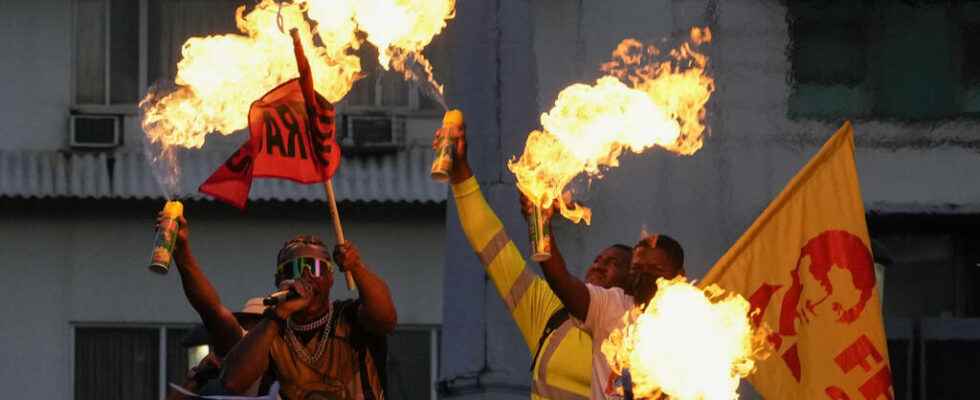The Panamanian government announced with great fanfare that it had reached an agreement with trade unions to put an end to two weeks of protest, an unprecedented movement in Panama for several decades. Protesters demand government action against inflation and corruption. As part of this agreement, the price of a gallon of gasoline, which has soared nearly 50% since January, has been frozen at 3.30 dollars for a period of three months, notes The Estrella of Panama. The newspaper El Siglo confirms that some roads were then unblocked, but specifies that others are still cut off, in particular the Pan-American highway which crosses this Central American country.
Indeed, some unions do not approve of this agreement, like Saul Mendez, the general secretary of the National Union of Construction Workers, who is calling for new action on Monday in the streets of Panama. ” The government must open a serious dialogue with the representatives of the organizations that are still on the street. The people must radicalize their movement and put an end to this charade “, he launches in a video broadcast on Instagram on the account of his union.
“Panama has tolerated years of corruption”
” The people are on the streets not only for the price of fuel, but also for the price of medicine, electricity, food, and to change the model of exploitation of the Panamanian people, the neoliberal economic model “, adds Saul Mendez.
For the editorialist of La Prensa, this crisis in any case requires urgent changes. The columnist notes that it is in the midst of this social unrest that the Odebrecht trial opens today, “ a case that is undoubtedly one of the ingredients of the current popular discontent “. This people has tolerated years of corruption and no longer wants to be silent, adds La Prensa. The newspaper is concerned to see the State borrow or go into more debt to appease this social conflict. On the contrary, the editorialist calls on the government to do ” a real sacrifice, to stop waste and clientelism “.
In Haiti, a state attack in Cité Soleil, according to the RNDDH
The gang war continues in Cité Soleil, the most disadvantaged town in the Port-au-Prince metropolitan area, and the number of victims continues to grow. He passed “from 89 dead (…) on Wednesday July 13 to around 300 people killed (…) this weekend “, writing Le Nouvelliste. Most of the victims are civilians, especially women and children, according to the director of the National Network for the Defense of Human Rights.
Asked by the novelist, Pierre Espérance, launches that “the population of Cité Soleil is the victim of a state attack », « this same policy had begun under the reign of former President Jovenel Moïse “. ” It results in attacking the inhabitants of disadvantaged neighborhoods to place them under the domination of gangs in the run-up to elections. “, he adds. Pierre Espérance calls on the population to ” Turn the situation around “smooth” » and to mobilize against « the tie bandits “.
Haiti, where teachers face sexual harassment from their students, according to Ayibopost. “The subject is still taboo », Explains the Haitian media, and this explains why few dare to talk about it. Two women agreed to testify to wandering hands and inappropriate remarks about their physique. Men can also be victims, points out Ayibopost. But “hasNone of these professors, female or male, informed their superiors to avoid making things worse or being stigmatized.
Canada: organizational problem around Pope Francis’ trip
In Canada, indigenous communities are trying to organize themselves for the visit of Pope Francis, which begins on Sunday. He must visit Edmonton, Alberta, before Quebec and Nunavut. A journey presented as a penitential pilgrimage “, Write the Montreal Gazette. In particular, Pope Francis must apologize for the role of the Church in the Canadian residential school system. Until 1980, some 150,000 indigenous children were forcibly enrolled in these establishments, which aimed to assimilate them into the dominant culture. Thousands never came back.
The survivors of these residential schools therefore try to attend the five meetings planned with the indigenous peoples, but many are still struggling to obtain tickets on D-6, explains the Globe and Mail. At issue: a communication problem with the Catholic Church and the federal government which does not clearly explain how to obtain the promised funding to attend.
In the United States, Native Americans want to recover the property of their ancestors
Pairs of beaded moccasins, ceremonial pipes: “ some 200 items stolen from the bodies “victims of the” worst massacre of Native Americans in US history “mouldy on the shelves of” the obscure museum from a public library in Barre, Massachusetts, reports the washington post. ” 250 Lakota men, women, and children massacred by the U.S. military in the 1890 Wounded Knee Massacre, South Dakota “.
Since then, these objects have been sold by gravediggers, used by a traveling shoe salesman in a traveling show on the Wild West, before the latter donated them to the museum of his city. Despite requests from members of the community, the museum refuses for the moment to part with it. ” These items are among more than 780,000 Native American grave goods and possessions [actuellement] held in museums or other institutions (…), according to a report to Congress”, indicates the washington post.
After abortion, the rights of homosexuals?
Finally, a word from the statements of Ted Cruz in Texas in his last podcast. On the heels of the overthrow of Roe v. Texas senator Wade urges Supreme Court to reverse 2015 ruling that legalized same-sex marriage, reports The Hill. ” The decision clearly wrong at the time it was made. The court went too far “, according to Ted Cruz, for whom “States should be able to decide their own laws “. This idea had already been suggested by Clarence Thomas, one of the Supreme Court justices.
